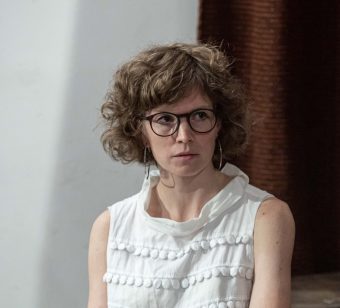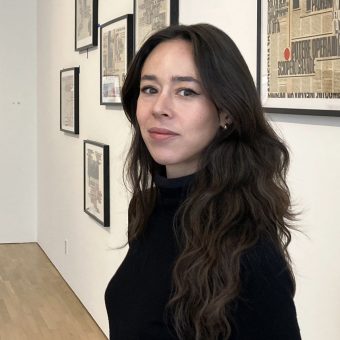Current Fellows
Anna Szirmai
WINTER-SPRING 2024

Anna Szirmai is a researcher and museologist at the Research Department of the Central European Research Institute for Art History (KEMKI) in Budapest.
She holds a PhD in Italian Literature and has a background in Art History and Italian Studies from Eotvos Lorand University, Budapest.
Her dissertation, entitled Tendencies of Italian Experimental Poetry in the Sixties-Seventies, examines the main characteristics and motives behind the development of the various verbovisual poetry movements in Italy during the turbulent years of the lead. On the basis of her archival research in various museums and archives throughout Italy, she has developed a comprehensive method of interpretation to examine the visual and sound poetry works, as well as an in-depth historical analysis. She is currently seeking the possibility of publishing her dissertation as a book in Hungarian. Her research in the field of Italian experimental poetry is a unique addition to the international academic discussion, as the topic is not widely discussed in Hungary.
Anna has been a guest researcher and participant in internship programmes in Italy: Fondazione Morra (Naples), Museo Carale (Ivrea), Fondazione Berardelli (Brescia), Fondazione Bonotto (Molvena) and the Archivio del’ 9oo of the Museo di Arte Moderna e Contemporanea di Trento e Rovereto (Mart).
Her recent publications in Italian include: Tomaso Binga: il corpo della lettera, ustsanga.it, 27 March, 2018, Riviste di poesia sperimentale negli anni Sessanta-Settanta in Italia. Riviste Italiane d’artista nella collezione dell’Archivio Artpool di Budapest, IN: Dai margini a dentro, da dentro ai margini. Mappe dei cambiamenti letterari e culturali, AIPI, Firenze, 2018. Strutture ed elementi classici nella poesia visiva di Eugenio Miccini, XII Convegno Italo – Ungherese Lincei Budapest, 2013.
Her research project at CIMA is entitled: Recombining Pieces of Reality. Poetry and Activism in Nanni Balestrini’s Collages. The focus of the comparative approach is to explore the visual similarities and motivations shared by East Central European and Italian collage in the period of the sixties and seventies. Nanni Balestrini had an extraordinary body of work in collage, a genre that can reconcile poetry and visual art and has international connections. She will analyze the possible interactions between the Italian neo-avant-garde and East-Central European tendencies in relation to experimental art practices. The Eastern European point of view can give a new aspect to the already complex research background of monographic approach to the oeuvre of Nanni Balestrini. Her comparative approach can lead to new explorations regarding the visual codes used by artists of different background, living in different countries but fighting for the same social values. The main focus of her research project is to find links between the artistic practice and socio-cultural background of selected Eastern European artists, Katalin Ladik (Hungarian born in Yugoslavia) and Attila Csernik (Hungarian born in Yugoslavia), in relation to that of Nanni Balestrini.
Francesca Zambon
WINTER-SPRING 2024

Francesca Zambon earned her PhD in Italian Studies at Brown University (2023) with a dissertation titled Resistance to and through Autobiography: Poetry and Politics in Post-War Italy. During Fall 2023, she held the position of Visiting Assistant Professor at the same institution under the Deans’ Faculty Fellowship.
Her research explores the relationship between literature, politics, and gender and sexuality studies, challenging conventional notions of the “political” and investigating how writers resist and transcend oppressive narratives imposed by institutionalized hegemonic perspectives. Her current book project, expanding upon her dissertation, delves into the relationship between poetic production and political activism in post-World War II Italy, aiming to redefine traditional understandings of poetic engagement and foster a more inclusive, intersectional, and transnational dialogue on post-war Italian poetry and political poetry at large.
Francesca completed her BA at Ca’ Foscari University of Venice and her MA at the University of Bologna, specializing in twentieth-century neo-avant-garde poetry with a focus on Edoardo Sanguineti. She obtained a Magistral License from the School of Superior Studies “Collegio Superiore di Bologna” and a Doctoral Certificate in Gender and Sexuality Studies from the Pembroke Center for Teaching and Research on Women. Considering both the legacies and limitations of neo-avant-garde practices, she explored diverse dimensions of art as a form of political resistance, including Artaud’s concept of “cruelty” within and beyond the Living Theater and the performativity of poesia-teatro; the transgressive bodies in Carol Rama’s paintings; Carla Cerati’s militant photography; and the artistic responses to Aldo Braibanti’s 1968 “plagio” trial.
As a fellow at CIMA, Francesca’s project delves into the phonic-optic dimension of Balestrini’s work, viewing it as a vital component of his poetics of denunciation and resistance. By tracing his personal, geographical, and socio-political displacements alongside the evolving sciences and technologies of post-war Italy, she explores Balestrini’s work as an embodiment of an evolving yet structured materiality. In alignment with the Futurist call to “embrace the life of matter”, yet situated at the opposite end of the political spectrum, Balestrini aims to capture the tangible materiality of revolution—the experience of bodies immersed in the physical and sonic dimensions of societal upheaval, creating a chain of vibrations that are both physically and intellectually perceived. Ultimately, Francesca seeks to extract and illuminate modes of resistance relevant today, with Balestrini’s artistic trajectory symbolizing the demise of the revolutionary aspirations of 1968 while also creating a space for forging a new dimension of struggle.
